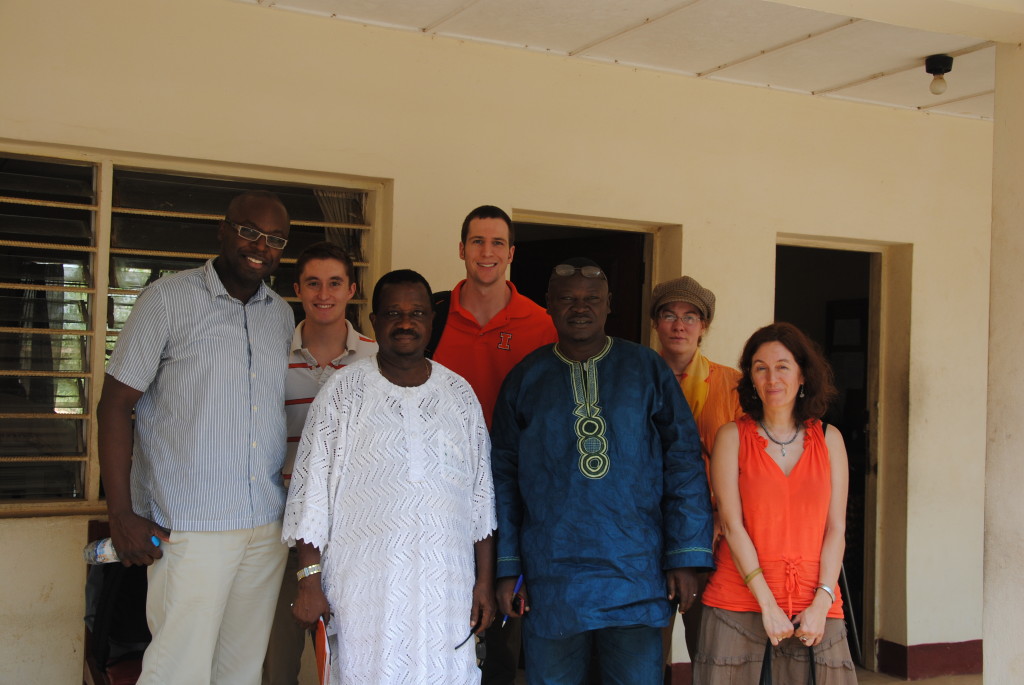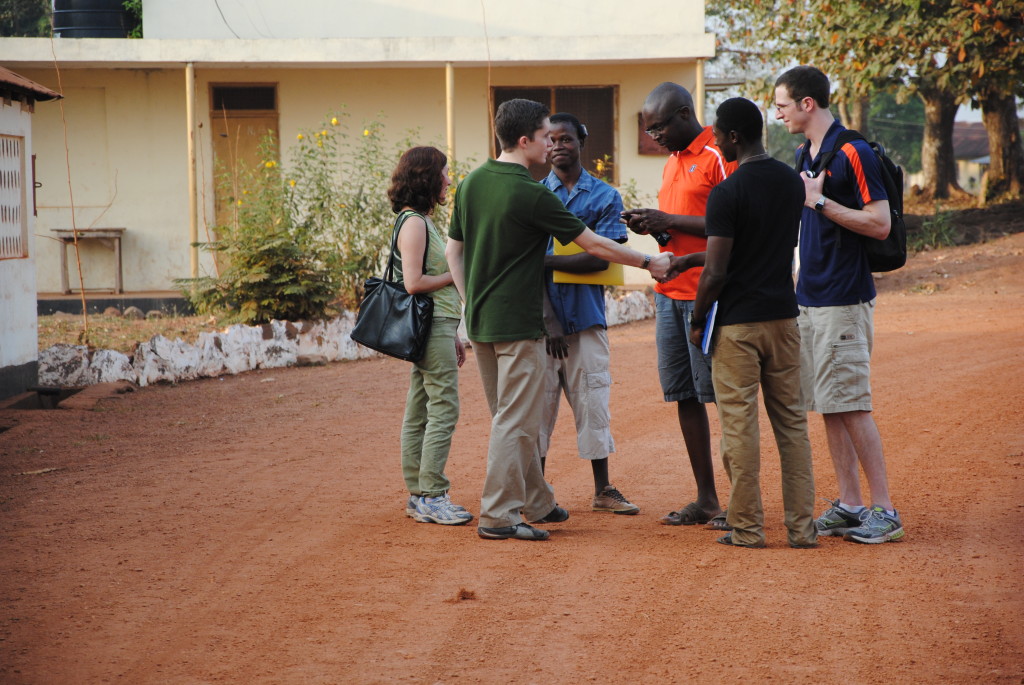Greg Damhorst is an MD/PhD student in the Department of Bioengineering at the University of Illinois at Urbana-Champaign . His graduate research involves the development of diagnostic technologies for HIV/AIDS. Greg is also a co-founder of the Global Health Initiative at the University of Illinois, an academic community that seeks to build multi-disciplinary efforts around global health issues.
As an MD/PhD student who works with pathogens on a daily basis, I can appreciate a virus for what it truly is: a sub-microscopic assembly of biomolecules – the same building blocks which make up all of life. Viruses – “organisms at the edge of life” – are non-living yet possess the cunning to infect, replicate, and destroy. It’s exciting to me, in a purely academic sense, when a virus becomes headline news. But if we truly listen, the things Ebola has taught us in 2014 are much more than a biology lesson. Unlike the virus itself, the inequalities that Ebola has exploited, highlighted, and perpetuated cannot be bleached away or combated with a good vaccine. If we listen, these are the lessons that the Ebola outbreak is teaching.
The current epidemic was first beginning to talk hold in Guinea last February when I was visiting neighboring Sierra Leone. The purpose of my visit was to meet with colleagues at Njala University, an institution planted by University of Illinois faculty in the 1960’s fulfilling a USAID program. Our goal, as we joined in celebrations of Njala’s 50th anniversary, was that collaboratively we could identify opportunities for partnership in health-related academic research, training, and outreach. This brief visit introduced me to a university community emerging from the devastation of a civil war, eager to expand its impact as a leader within Sierra Leone and a peer amongst academic institutions globally.
I met students training in Njala programs like agribusiness and nursing – future leaders who perhaps embody what their country needs most. Today, their campus is shut down by the outbreak. I traveled roads which were improving rapidly and saw first-hand the evidence of rising infrastructure, much of it driven by foreign developers who today are unlikely to be found. Their absence may be just a fraction of the toll Ebola is taking on West African economies. The first lesson that Ebola is teaching is that the conditions which have predisposed the region to this outbreak are being perpetuated by its presence.
The second lesson involves the world’s response. When American doctors and nurses contracted the disease, they had options not available to West African patients. They benefited from evacuation to the U.S., advanced facilities, and experimental treatments. It is critical that we do not forget the challenging questions these series of events raise. Attempt to place yourself in the shoes of the patient who laid in the bed next to the white missionary doctor in an Ebola treatment center in Liberia: As he is transferred to an ambulance and driven to a medivac aircraft, you remain in a makeshift facility for which the term “inadequate” is an insufficient description. When word reaches you that the Americans are receiving experimental substances and recovering from a disease for which there is no specific treatment available – a disease from which you are expected to die – the situation must be all the more disheartening.
It’s difficult to make a blanket statement against the handling of Western Ebola patients. The import of cases to the U.S. provided the opportunity to study the disease at a depth never possible before. The costs, meanwhile, are not entirely clear. While I found the preferential treatment of Western patients unsettling, I wondered to what extent previously arranged insurance may have covered the expense of evacuation. The administration of experimental therapies, meanwhile, raises ethical questions that may not have correct answers. But another lesson we must learn from Ebola is that while the Western missionary doctor can purchase relatively low-cost medical travel insurance, no such option exists for the Sierra Leonean, Liberian, or Guinean. No aircraft is waiting to take them to a state-of-the-art facility. The American is privileged with access to such resources, while the West African would be lucky to be granted a tourist visa to the U.S. should she be able to afford the application fee. This is a structural inequality that was in place long before patient zero.
Many people have undoubtedly wondered why a vaccine or treatment for Ebola did not exist before this outbreak. The simple answer, unfortunately, is that Ebola is not a large enough disease, nor does it affect wealthy enough people, to carry the economic incentive for pharmaceutical companies to develop such a drug. The third lesson Ebola has taught us – and one for which I am extremely ill-equipped to offer any suggestions for solutions – is that the economics of pharmaceuticals needs to be reimagined. Activism has made a difference in increasing access to pharmaceuticals in the past – perhaps this is another moment when the world must demand change.
Our society seems to have an obsession with firing the head coach in response to a losing football season – we are obsessed with blaming leadership for a lack of better outcomes. Yet our mistake is in thinking that a change in leadership represents a solution. In many ways it has been the same with Ebola. The Ebola crisis has been wielded as a political tool in just this manner (did anyone else notice a reduction in media hype following the midterm elections?).
Possibly the biggest lesson we must learn from Ebola is that it is a disease which targets the people we like to forget by exploiting the conditions with which we’ve grown too comfortable. While we celebrate this year’s responders at the front line of the crisis, we need to realize that those who are in it for the long-haul are the heroes who would prevent the next episode, including those who seek to train where there is a lack of physicians and educate where there is low literacy. Blaming our leaders for the problems Ebola has caused is a convenient distraction from asking ourselves what we can do to address the underlying problems, while our true failure is that of forgetting to invest in the empowerment of our neighbors. Perhaps it is the responsibility of campus-communities like Champaign-Urbana to seek out ways to further partnerships, to hold in high regard the expertise of our colleagues at institutions like Njala, and to leverage the globalization of our century toward novel ways forward together.
Perhaps the radio silence that follows when American hospitals have released the last cases and when fueling hysteria is no longer useful as a political tool will give us an opportunity to examine these lessons. The world will solve the Ebola problem – and I pray it’s sooner rather than later – but the vaccine or treatment or the public health education and containment which will ultimately stop this epidemic will not cure the underlying problems which made West Africa vulnerable to the largest outbreak in history.
My hope is that we will think beyond fear, that we’ll respond to the need to build-up and empower individuals in West Africa and low-resourced regions around the world through partnering, educating, and creating opportunities. These are the lessons Ebola is teaching – are we listening?




